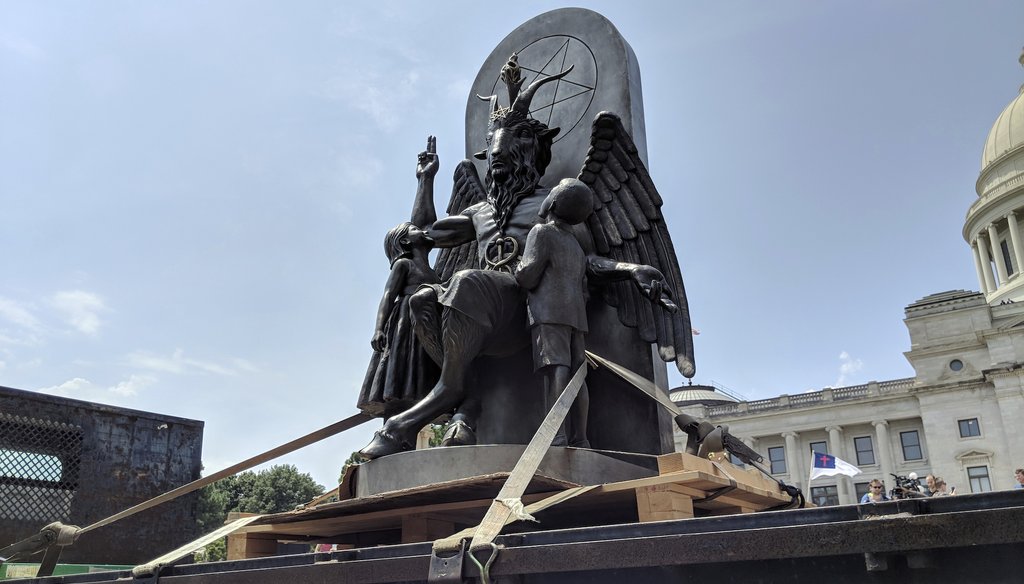Get PolitiFact in your inbox.

The Satanic Temple unveils its statue of Baphomet, a winged-goat creature, at a First Amendment rally in Little Rock, Ark., on Aug. 16, 2018. (AP Photo/Hannah Grabenstein)
If Your Time is short
-
The Satanic Temple, which is recognized by the IRS as a tax-exempt church, created a “Satanic Abortion Ritual” it says exempts its members from state abortion restrictions.
-
The temple has filed lawsuits on behalf of members seeking abortions but so far has been unsuccessful in court.
-
Legal experts we spoke with provided mixed assessments of the merits of the temple’s arguments.
A leaked draft opinion showing that a majority of the Supreme Court may soon overturn Roe v. Wade has prompted some social media users to urge people to turn to The Satanic Temple to protect their abortion rights.
A TikTok video posted on May 3, 2022, has a text overlay that reads, "How to protect your religious freedom of abortion." The video then shows a user going to the website of The Satanic Temple, then signing up to become a member. A final image shows a page of the site that describes a "Religious abortion ritual."
The Satanic Temple, which was founded in 2013 and was recognized by the IRS as a tax-exempt church in 2019, does not actually worship the devil. Its members instead believe that "religion can, and should, be divorced from superstition," according to its website’s frequently asked questions page. The group, based in Salem, Mass., says its mission is to "reject tyrannical authority" and "oppose injustice."
To that end, the temple has taken on a variety of religious freedom and equality fights, including seeking after-school Satan clubs for kids, Satanic prayers at government meetings in Arizona and Boston, and bringing a statue of the goat-headed Baphomet to protest a Ten Commandments monument at Arkansas' state capitol.
The temple has also waded into the politics of abortion. However, so far it has not been successful in court.
The temple lost two separate abortion rights cases in Missouri, one in 2019 and another in 2020, each over the state’s informed consent law. The U.S. Supreme Court declined to hear the later case.
To bolster its legal arguments after the Missouri cases, the temple created what it calls a "Satanic abortion ritual," that it says exempts its members "from enduring medically unnecessary and unscientific regulations when seeking to terminate their pregnancy."
The ritual involves reciting two of the temple’s seven tenets, which read, "One’s body is inviolable, subject to one’s own will alone" and "Beliefs should conform to one's best scientific understanding of the world. One should take care never to distort scientific facts to fit one's beliefs."
In February 2021, the temple sued the Texas Health and Human Services Commission on behalf of an anonymous member, "Ann Doe," arguing that a state law violated their religious beliefs by making patients seeking abortions undergo sonograms and adhere to a waiting period before the procedure.
In the Texas lawsuit, its lawyers argued that the law violates Texas’s Religious Freedom Restoration Act.
The federal Religious Freedom Restoration Act was signed into law in 1993 and was meant to limit the government "from substantially burdening a person's exercise of religion." Because the Supreme Court ruled that the law only applied to the federal government, 23 states have since enacted their own state laws.
The temple’s website said, "This case serves as the basis for establishing our claims to religious exemptions from abortion restrictions in states across the nation."
"In accordance with the Religious Freedom Restoration Act and the First Amendment, our religious abortion ritual is protected from substantial burden by the government unless the government can show a compelling governmental interest and the least restrictive means are taken to ensure that interest," Malcolm Jarry, the temple's co-founder, said. "Whether the states that enacted RFRA adhere to their own laws is another matter, but the law is unambiguous, and it protects our members' religious liberty."
However, in August 2021, a judge dismissed the temple’s claim that abortion restrictions violated Texas’ Religious Freedom Restoration Act "for lack of subject matter jurisdiction." The lawsuit is still active, but was stayed in December pending a U.S. Supreme Court ruling in another abortion case.
The temple is also taking aim at a more recent Texas abortion law, S.B. 8, which effectively bans most abortions in the state after six weeks. It is readying a second lawsuit against the state using a RFRA argument.
Jarry said the temple has drafted a lawsuit he said would be filed soon against the U.S. Food and Drug Administration. The temple hopes the FDA will let it distribute the abortion pills mifepristone and misoprostol "for use under medical supervision as part of our religious abortion ritual."
That effort will cite the federal Religious Freedom Restoration Act, Jarry said, noting the law has an exception that allows Native Americans to access peyote for religious rituals. An attorney for the temple has sent a letter to the FDA seeking permission to distribute the drugs.
"Because peyote is a Schedule 1 drug with no accepted medical use, our ask is much more reasonable from a legal perspective," said Jarry. "Unfettered access to these drugs would be a considerable step toward enabling TST to perform our abortion ritual without government interference."
But will those members get the protection from abortion laws they are seeking? Legal experts we spoke with were not sold on the merits of the temple’s arguments.
Both federal and state Religious Freedom Restoration Acts have been used in a number of cases, sometimes successfully, like the federal Hobby Lobby ruling involving the Affordable Care Act’s contraception mandate, and a Texas case about hair and religion brought by two school students.
Richard Foltin, a fellow for religious freedom at the Freedom Forum Institute, said that arguments under the religious freedom laws are only available for "sincerely held religious beliefs."
While courts generally don’t question the sincerity of religious beliefs, it "might be raised if it could be demonstrated that someone joined the Satanic Temple for the specific purpose of being able to assert a religious exemption for abortion," he said.
Douglas Laycock, a professor of law and religious studies at the University of Virginia, said it might be difficult for the temple to prove sincerity. He also expressed skepticism that religious freedom theories could "change the mind of the five or six justices who are overruling Roe v. Wade."
"Religious belief needs to be the primary motivation for the abortion. It's not enough that my religious beliefs permit abortion; they have to motivate abortion," he said. "I don't know any religion that teaches anything like that, except that Jewish law teaches a duty to save the life of the mother, and probably some other faiths do too."
Charles Haynes, a senior fellow for religious freedom at the Freedom Forum Institute, said the temple’s arguments may pass the sincerity test, but likely face other, tougher hurdles.
"Texas will argue that the state has a compelling state interest in banning abortion (under this law after six weeks) to protect the life of the unborn (as the state defines the issue)," Haynes said. "Showing that Texas laws restricting abortion "serve no medical purpose" is a high bar that I doubt can be reached."
While the temple has not had success in court on abortion rights so far, Jarry said the organization’s efforts will continue, especially given the latest news from the Supreme Court.
The temple has over 600,000 registered members and gained 21,000 new members in the 24 hours after the Supreme Court leak broke, Jarry said.
"As opposed to many pro-choice entities who have been fighting a defensive battle in retreat all these years, our approach has always been to go on the offensive and demand our lawful religious rights to unfettered abortion access," Jarry said. "Eventually, we will expect to find a judge who respects the law."
Our Sources
TikTok video, May 3, 2022
The Satanic Temple, "The Satanic Temple v. Texas," accessed May 3, 2022
The Satanic Temple, lawsuit, Feb. 5, 2021
The Satanic Temple, legal action, accessed May 3, 2022
The Satanic Temple, tweet, Sept. 1, 2021
The Satanic Temple, "Frequently asked questions," accessed May 3, 2022
The Satanic Temple, YouTube, "Religious Abortion Ritual"
The Satanic Temple, "Satanic abortions are protected by religious liberty laws," accessed May 3, 2022
Email interview with Malcolm Jarry, cofounder of The Satanic Temple, May 4, 2022
Email interview with Charles Haynes, a senior fellow for religious freedom at the Freedom Forum Institute, May 4, 2022
Email interview with Richard Foltin, a fellow for religious freedom at the Freedom Forum Institute, May 4, 2022
Email interview with Douglas Laycock, a professor of law and religious studies at the University of Virginia, May 4, 2022
The Associated Press, "Satanic Temple: IRS has designated it a tax-exempt church," April 25, 2019
United States District Court Southern District of Texas, "Order to deny motion to dismiss without prejudice and staying case," Aug. 9, 2021
United States District Court Southern District of Texas, "Order to deny motion to dismiss without prejudice and staying case," Dec. 21, 2021
Kezhaya Law, letter to the Food and Drug Administration, Aug. 31, 2021
Texas Legislature, "Civil practice and remedies code," accessed May 3, 2022
United States Congress, "H.R.1308 - Religious Freedom Restoration Act of 1993"
The Conversation, "How the Satanic Temple is using ‘abortion rituals’ to claim religious liberty against the Texas’ ‘heartbeat bill,’" Sept. 22, 2021
Dallas Morning News, "Satanic Temple challenges Texas abortion restrictions for its members, claiming religious exemptions," Sept. 17, 2021
San Antonio Express-News, "Satanic Temple says Texas abortion law violates the religious freedom of its members," Sept. 8, 2021
Houston Chronicle, "What to know about Texas' abortion law, with Roe v. Wade reportedly in serious jeopardy," May 3, 2022
Houston Chronicle, "Satanists say 'Abortions save lives!' on billboard outside Houston," Dec. 17, 2020
The Washington Post, "Woman says Missouri’s strict abortion regulations violate her religion: the Satanic Temple," Jan. 23, 2018
Courthouse News Service, "Satanist Loses Challenge to Missouri Abortion Consent Law," June 9, 2020
The Associated Press, "Satanic Temple member loses fight on Missouri abortion law," Feb. 13, 2019
The Associated Press, "Federal appeals court axes Satanic Temple abortion lawsuit," June 9, 2020
NPR, "'We Have No Choice': A Story Of The Texas Sonogram Law," Jan. 22, 2013
The New York Times, "Here’s What the Texas Abortion Law Says," Sept. 9, 2021




















